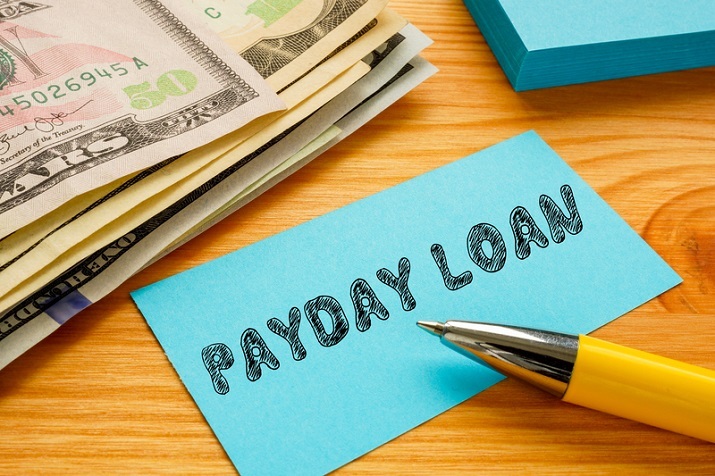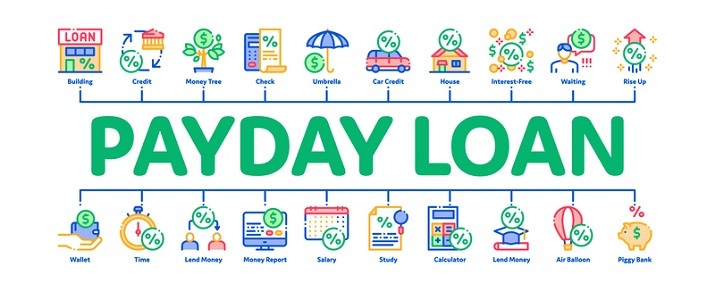
 Data Structure
Data Structure Networking
Networking RDBMS
RDBMS Operating System
Operating System Java
Java MS Excel
MS Excel iOS
iOS HTML
HTML CSS
CSS Android
Android Python
Python C Programming
C Programming C++
C++ C#
C# MongoDB
MongoDB MySQL
MySQL Javascript
Javascript PHP
PHP
- Selected Reading
- UPSC IAS Exams Notes
- Developer's Best Practices
- Questions and Answers
- Effective Resume Writing
- HR Interview Questions
- Computer Glossary
- Who is Who
Pay Day Loan
Introduction
Taking out loans is a convenient way of financing projects or property buying. However, what is the option when you don't need funding of such large amounts. What if you are in need of smaller amounts and that too immediately. This is when a Payday loan comes into picture. Let us understand what a Payday Loan is in detail.

Define Payday Loan
Payday Loans are short-term loans unlike other loans. As they are short term loans, the rate of interest is higher as compared to other loans. These loans are generally $500 or less depending on your income or next payday.
Although Payday Loans are a quick way of getting cash, one must be aware of the working and rules of a Payday Loan. Unlike our normal loans, Payday Loans provide immediate cash. Now let us see how Payday Loan works in detail.
Understanding Payday Loan
Payday loans have a slightly different working than normal loans. Let us see how it works step by step.
A Payday Loan provider will ask for proof of income. This is to know if you are eligible for a Payday loan. This is usually a paycheck from your employer
Next the lender will give you some amount of the money from the loan. This depends on what your pay is.
Once you get the loan, it needs to be paid back within a few days, usually around 30 days or less.
Characteristics of Payday Loan
Now that you know the working of a Payday Loan, let us see some characteristic features of a Payday Loan
Simple Application Process
Payday loans are simpler and more straightforward for applying as they can be done online or at a Payday Loan storefront.
Borrowers are required to provide proof of income, verification ID, and a valid bank account for funding of loan.
Smaller Loan Amounts
Payday Loans are typically smaller amounts that are in hundreds or thousands.
The amount of loan is usually dependent on the borrower's income and their ability to repay the loan in a shorter amount of time.
Higher Interest Rates
Payday Loans usually have a much higher rate, higher than the usual loans.
The interest rates are expressed as Annual Percentage Rate (APR) which may increase upto a several hundred percent.
Because the loan term of such payday loans is short, the interest rates tend to be higher.
Short Loan Term
Payday loans are to be paid in a short or less amount of time.
This time is either two to four weeks after the loan is taken
Or this could be until the borrower gets his or her next paycheck
There is an option to extend the loan term too, if the borrower is not able to repay it in time. However, this does result in extra charges
Possibility of A Debt Cycle
The major drawback of a Payday loan is that there is a high chance for the borrower to enter into a continuous cycle of debt.
Meaning, if the borrower is not able to repay the loan in time, he or she will have to take out another loan to repay the first loan.
This may end up being a cycle of a number of debts which will in turn lead to accumulation of debts
Varied Rules and Regulations
Payday Loans rules and regulations are not the same everywhere. They vary depending upon the state and country.
Purpose and Need For Payday Loan

As said earlier, Payday Loans have a very high interest. They have a short repayment term and the amount borrowed is usually very less, that is hundreds or thousands. Costs of Payday Loans are quite high which is the worrying factor for the borrower as there is a possibility of getting trapped into a debt cycle.
For Payday loans, the borrower should keep in mind whether they can really pay the loan amount along with the interest until their next paycheck. If that is the case, then opting for a Payday Loan makes sense.
Fees and Charges for Payday Loan
Payday Loan lenders typically charge higher interest rates as compared to other loans as Payday Loans are riskier due to their short tenure. Moreover, the rules and regulations of these interest rates are governed by their respective state. Payday loan lenders are allowed to charge as much as 780% APR, that is Annual Percentage Rate.
Uses Payday Loan
In most cases Payday loans are taken to fulfill day to day expenses such as bills, rent, credit card bills, student loans or mortgages. Moreover, a Payday loan is taken by those people who do not have access to major, efficient financial organizations.
Examples of Payday Loan
Payday Loan companies have different rules and loaning systems. Payday loans charges are generally expensive - around $10 to $30 for every $100. Say for example, if an individual takes a loan of $200 with a pay of $20, then when he/she needs to pay for the loan, then that individual will have to give a total of $240, that is the loan of $220 and $20 will be the charges.
Conclusion
To sum up, we can say that payday loans are expensive, with a high rate of interest and are a major risk factor for the borrower. Payday Loans differ in the fact that money transactions here happen quite faster than other loans. When in urgent need of cash, Payday Loans work the best. However, Payday loans can put the borrower in a debt cycle, if the repayment of loan is not done within the given time. However, a Payday loan is beneficial if the borrower is sure that he or she will be able to pay back the loan in their next paycheck.
FAQs
Qns 1. How do payday loan companies make money?
Ans. Payday Loans have a high rate of interest and high fees depending on the company. Every company makes money on payday loans with fees that are charged.
Qns 2. Are Payday Loans secured or unsecured?
Ans. All Payday Loans are unsecured, that is there is no collateral that you can give to the lender
Qns 3. Does a Payday Loan remain in the system?
Ans. Unlike normal loans which stay for six to ten years, Payday loans do not stay in the system, even in cases of late repayment.

